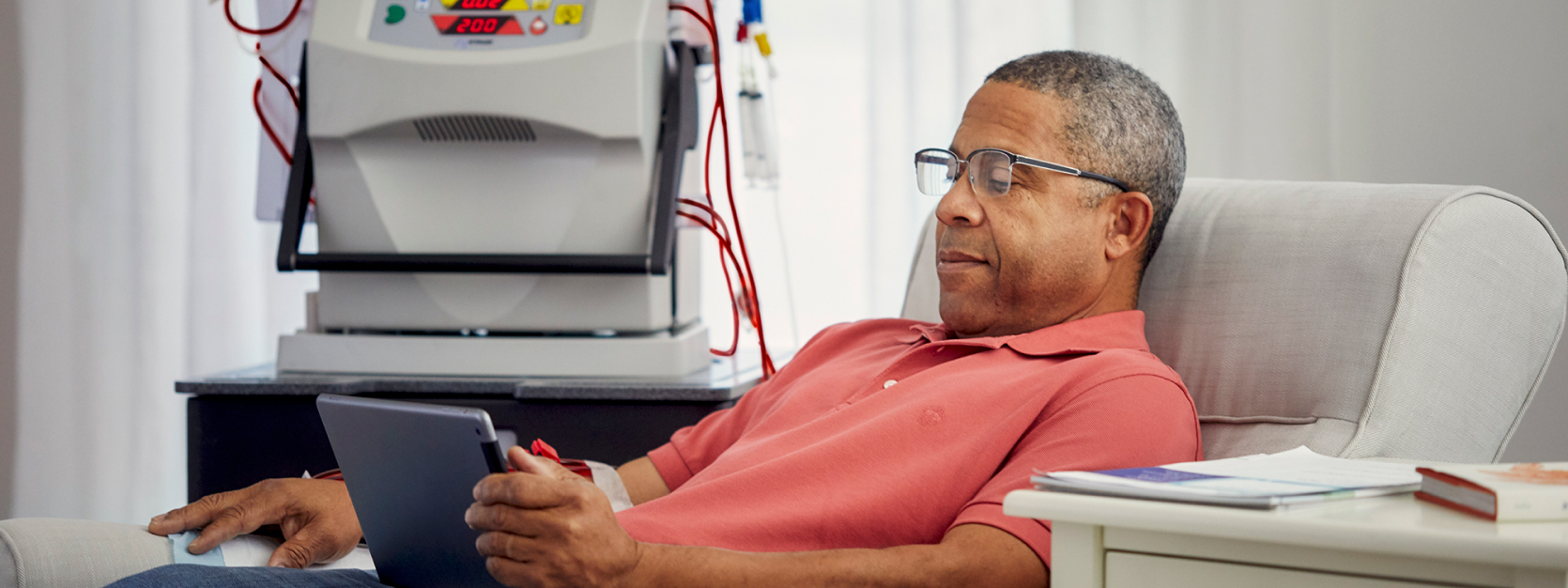Home Dialysis Training
You will need training to perform dialysis at home, whether you are starting peritoneal dialysis (PD) or home hemodialysis (home HD). Though there is a lot to learn, we will provide everything you need to confidently and successfully perform dialysis at home.
Our training program, which varies in length depending on your needs, will teach you how to safely perform dialysis at home, monitor your health, and manage any potential complications. An experienced home dialysis nurse will guide you through every step of the training.
Something that’s important to know about home dialysis is that anyone can do it—there’s no medical experience required! Our training materials are easy to use and designed specifically for adult learners. We even provide translated materials or special needs accommodations if you need them.
From your home dialysis nurse to your care partner to the training materials and beyond, you are truly never alone when you choose home dialysis.
Go to section:


Support from a care partner
If you choose to have a care partner, they will go through training right along with you. The training period is a great time to decide how much or how little help you would like when performing home dialysis.
Fresenius Kidney Care supports care partners in many ways—by offering tips for care partners, sharing care partner resources, or helping schedule respite care at times when your care partner is unable to help with your treatment.

Train to do dialysis at home
No matter which type of home dialysis treatment you will be performing, our training program will teach you how to:

Training for home peritoneal dialysis (PD)
Your home dialysis nurse will work with you until you feel confident performing treatment all by yourself (or with a care partner, if you choose). You will learn how to connect and disconnect your catheter to the PD bag in a sterile way and how to add medicine to your PD bag if needed. Your nurse will also teach you how to drain out used dialysate and put in fresh dialysate⏤this is also known as an exchange.
Training for home hemodialysis (home HD)
After training, you will feel confident and ready to perform HD at home. Training topics will cover everything you need to know, including how to use your home hemodialysis and water machines and how to identify and troubleshoot each part of your equipment.

Tips for home dialysis training
Be patient with yourself during the training period and allow plenty of time to learn and build confidence. Remember that everyone learns at their own pace. Your home dialysis nurse will provide all the guidance you need to feel ready and confident. Even after that, you will always be surrounded by plenty of resources and support team members.
Here are some more tips to help you feel in control of your health, treatment, and time:
- Go to the grocery store before you start training
Following a kidney-friendly diet is key when you are on dialysis. Set yourself up for success by going grocery shopping before you begin home treatment. When your kitchen is stocked with kidney-friendly meals, you will be able to focus all of your energy on training. - Stay rested
It’s easier to focus when you are well rested. Approach training with an alert mind by getting a good night’s sleep before you start. You can also help yourself to feel more rested by journaling, meditating, or practicing deep breathing. - Take notes
It can be easy to feel overwhelmed if you don’t take notes. Writing things down during training can help you process the information at a later time. By taking good notes, you won’t feel pressured to remember everything right away. - Prepare to ask many questions
There’s no such thing as asking too many questions! Don’t be afraid to speak up if something isn’t clear during training. Our nurses and technicians are there to help you understand. - Ask to have a friend or loved one with you during training
Having a friend or care partner with you during training can help you feel more comfortable. They may even take notes and ask questions of their own. A care partner is just one more valuable resource for you to lean on during training and beyond.
Your first treatment at home
On that day, your nurse will come to your house to watch⏤and help⏤you and your care partner go through all the treatment steps in your own home with your own equipment. That way, they can make sure you both feel confident and safe dialyzing on your own.
Technicians will make sure that all your home dialysis equipment is in safe and working condition. They will also do regular maintenance checks.
